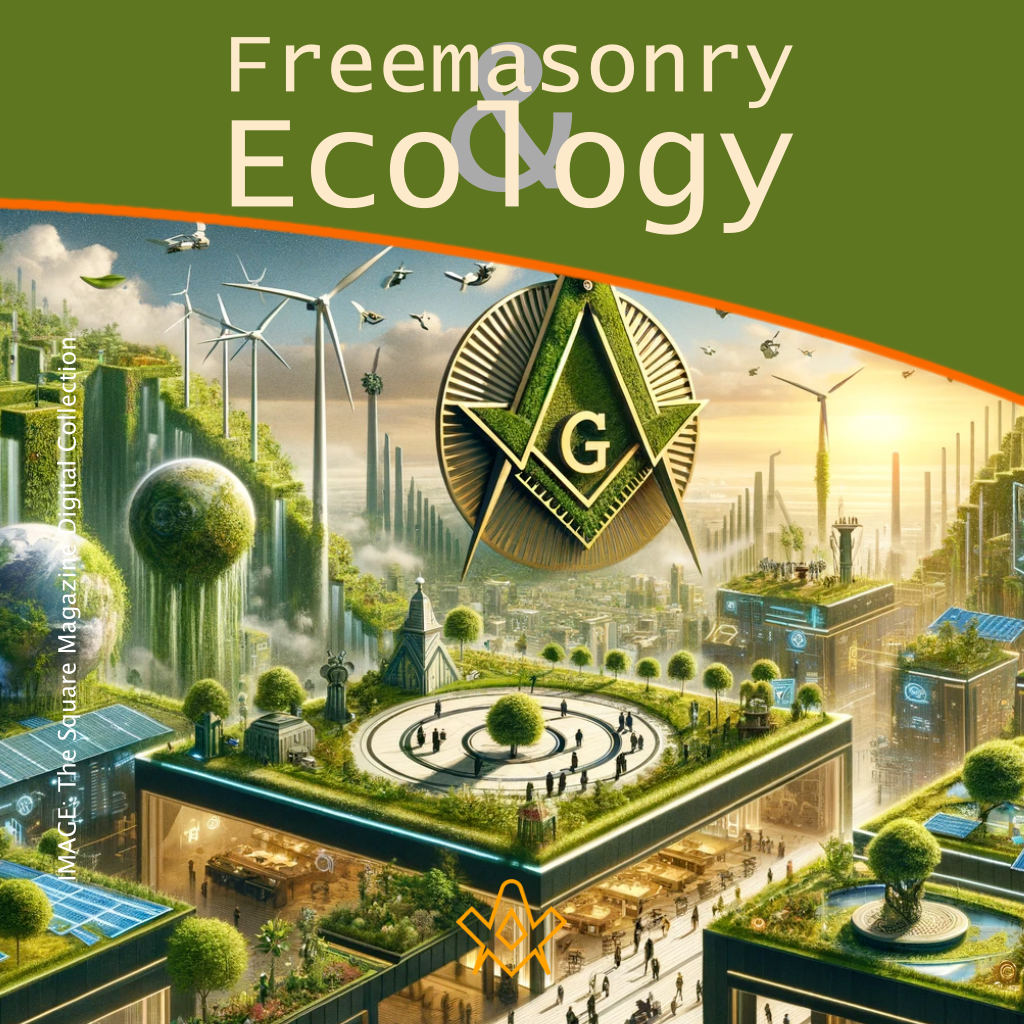Embrace the new paradigm of eco-conscious living in the 21st century. Freemasonry, a cornerstone of society, must evolve, placing Nature at its heart.
Reject anthropocentrism, embrace deep ecology, and champion sustainable living and global cooperation.
Let Freemasonry lead by example, advocating for a world where humans and nature coexist harmoniously.
In recent years I have expressed the opinion that freemasonry of the 21st century must be different from that of 1717 or the beginning of the 20th century, the freemasonry that we all know today.
The society we live in is different from the society of the past. Freemasonry as part of society must acquire a new image. The change in it cannot be different from the image we want our world to have in the new century.
The answers to the question that arises regarding this change are many and different. They come from the ideological, philosophical and political opinions and principles that each person has.
For this reason, the definitive answer can only come from examining the question “How do we want society and Masonry to be in the new century?” based on Good Word, Science and the evidence that will be presented to support any point of view. In this article I will present a proposal for one of the issues concerning the vision of the new age.
Although we have not realized it, the dominant problem of our time is the so-called ecological problem with the ecological crisis at its peak.
In my article, at the beginning, we will deal with the description of the subject and its implications. Then with the intervention and participation that Masonry can have in solving it.
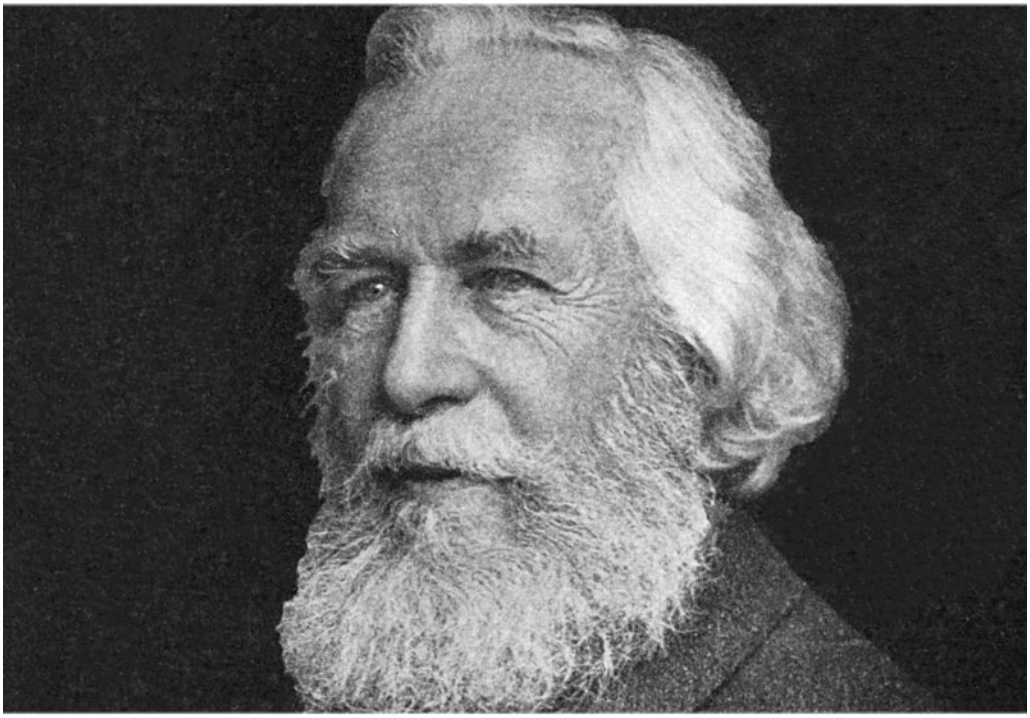
Ernst Haeckel (1834 – 1919)
IMAGE LINKED: wikimedia Attribution 4.0 International (CC BY 4.0)
The term “ecology” is derived from the Greek word “oikos” which means ‘home’. It was first proposed in 1866 by the German zoologist Ernst Haeckel (1834 – 1919). In modern terminology it means “the study of organisms in their ‘oikos’ or ‘natural residences’. [2]
It was developed as a separate branch of biology because it is recognized that plants and animals belong to self-regulating systems. These systems consist of living and non-living elements and are called ecosystems .
From the term ecology comes the term “ecologism” which represents a new type of politics. It appeared in the West since the 1960s and belongs to the post-materialist movements.
These are social movements that relate to quality-of-life issues, without class division. In contrast to the ‘traditional’ doctrines and ideologies, which have as their center of interest the human being, ecologism has at its center Nature.

the study of organisms
IMAGE LINKED: wikimedia Attribution 4.0 International (CC BY 4.0)
Nature is a complex system of ecosystems, with a larger global ecosystem called the ‘ecosphere’ or ‘biosphere’. Contrary to the viewpoint that the Human is sovereign of Nature, she considers that the Human is preserved by the world ecosystem and he is part of it.
Ecologism considers that the anthropocentric perception of the relationship between Humans and Nature must change. In its place we must create an ecocentric and naturalcentric model.
However, the way proposed for introducing this model into society is different among different environmentalists. The most important distinction is what the Norwegian philosopher Arne Naess (1912 – 2009) called “shallow” and “deep” ecology.

Arne Naess (1912 – 2009)
IMAGE LINKED: wikimedia Attribution 4.0 International (CC BY 4.0)
He calls “shallow ecology” or as his supporters call it ‘humanitarian ecology’, ecological trends that, while accepting of the principles and values of ecological thinking, seek to integrate them and adapt them to the needs and purposes of modern humans.
This form of ecological practice believes that if the natural environment is preserved, the Human who is part of it can also be preserved.
On the contrary, ‘deep ecology’ rejects ‘shallow’ as an indirect form of the anthropocentric perception of Nature, which seeks to maintain the well-being of the Human of the developed countries.
They do not accept that the Human, as a species, is superior or more important than other species or Nature as a whole. For ‘deep ecology’ the purpose of Human life is to contribute to the preservation and welfare of Nature.
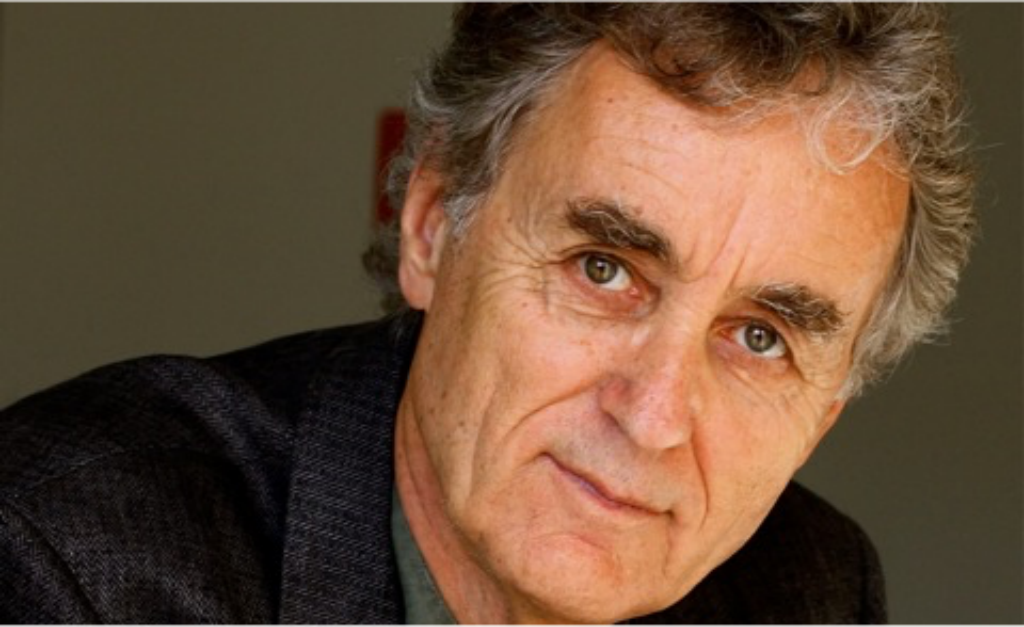
Fritjof Capra
IMAGE LINKED: wikimedia Attribution 4.0 International (CC BY 4.0)
Fritjof Capra (1939 – ) in his book Turning Point believes that the modern perception of the relationship between Human and Nature is the result of the influence of the 17th century philosophers, including Rene Descartes (1596 – 1650) and Isaac Newton (1642 – 1726/27).
For him, the world, before the 17th century, was considered an organic whole. After this point he considers it a machine. For this reason, he claims that Humans should be trained in a new perception of their relationship with Nature.
We must understand that Nature is not a machine that can be repaired and its performance improved. For Copra overturning the existing perception can be achieved by the creation of a new Paradigm [3].
The ecological problem today is mainly due to the effects of the increase in the average temperature of the planet.
This is due to industrial and human activity with the emission of gases that contributes to the greenhouse effect. The greenhouse effect was first discovered in the 19th century by the French Jean Batist Joseph Fourier (1768 – 1830) [4].
Except of this phenomenon, we come across other problems, such as environmental pollution by chemical and toxic products or residues and the appearance of mutant foods.
Studies by organizations such as, the American Geophysical Association or the United Nations Intergovernmental Panel on Climate Change, record changes in the climate of the planet, such as the increase in the temperature of the oceans and the surface of the soil, the decrease of ice, the increase of the sea level, the increased drought or rainfall phenomena.
The cause of them is the increase in greenhouse gases from combustion of fossil fuels. The main consequences of climatic change will be the increase in wars for resource recovery, the destruction of coastal towns and areas, immigration and the plight of populations, the increase in diseases due to environmental pollution [5].
These studies were challenged by a minority of scientists who believe that overheating is moderate and does not come from human activity. For them it is due to an irregular circle of 1500 years of climate change associated with solar activity.
They accuse the studies of the United Nations of not being the work of scientists but bureaucrats [6]. Of course, there are many reports that studies contrary to the problem of climatic change that have been funded by companies or institutions with specific economic interests [7].
The dominant opinion today is that: “The Climatic change brings into conflict what the planet needs to maintain its stability, with what the current economic model needs in order to continue to exist” [8].
Interestingly, while most people recognize the threat posed by the greenhouse effect, they feel that this threat is not immediate, because it has no visible effect on their everyday lives, so they do not do anything about it. This behavior was called the “paradox of Giddens” by the author of the same name [9].
Thus, the ecological movement faces problems such as that it can hardly become a global ideology, that the values of the industrial society, namely competition and consumerism, have been consolidated due to globalization, that the policy it proposes is anti-developmental, that it is considered to be ‘love for the environment’ fashion and reaction to industrial progress and that the profound incision in the life of the people it asks to bring about is more radical than any political ideology. [10]
The impact of climatic change is rapid and forces governments to consider that: “Climatic change is global both in terms of causes and consequences (and that) collective action at international level is critical” and they face it, at least in their reports, as the “Greater and wider market failure in history”. [11]
The civilization of our times is different from that of the past. It is global and cannot exist without the consumption of large amounts of energy.
To solve this problem, we do not have to go back to a society of the past. We need to use the new weapon we have, technology. By using it, it is possible to replace the use of fossil fuels for energy production, drawing energy from sustainable sources such as air, water and the sun.
Managing the problem of climatic change is a global problem. It cannot be dealt with at local or regional level but with coordinated global action.
It cannot be left to self-regulation of the Market. Decisions should be implemented with interventions by states, notably industrial ones, because they pollute more.
These interventions are not the solution, but will be the first stage of the solution of the problem. Reality has shown that the logic of austerity and the shrinking of the public sphere creates problems in repairing the damage caused by weather events. [12]

Anthony Giddens
IMAGE LINKED: wikimedia Attribution 4.0 International (CC BY 4.0)
Of interest are the duties that Anthony Giddens (1938 – ) believes concern the state planning in order to address the ecological problem.
These are the adoption of a long-term environmental policy, the promotion of a political and economic convergence – preparing the society for changes in energy consumption, mainly that produced from fossil fuels -, the implementation of an environmental policy based on the ‘polluter pays’ principle, supporting the economic interests that enhance and support an ecological policy and tackling initiatives that try to cancel it.
Furthermore, it is important to maintaining ecological policy at the top of the political agenda, to develop an appropriate legal and economic framework, to support a low fossil fuel consumption economy, to prepare society for the climatic change that will be felt, and finally the cooperation with agents of different levels [13].
All these policies can postpone tackling of climatic change in the future but cannot radically resolve it. In order to do so. Ηumanity needs to abandon its policies and practices that have created the problem.
These policies are based on competition, sovereignty and consumption and they are based on the fact that human is sovereign and exploiting Nature. The opinion of ‘deep ecology’ about the need for a new Paradigm seems necessary.
The new Paradigm will introduce a new way of life, with values, sensitivities and theories different from those prevailing in the current industrial age.
It will promote an attitude of life and relationship to the environment that is completely alien to the one existing and its culture. That is why ecologism has to face the biggest challenge for its policy.
This challenge is the breadth of the changes that society needs to make. Education will play an important role in this.
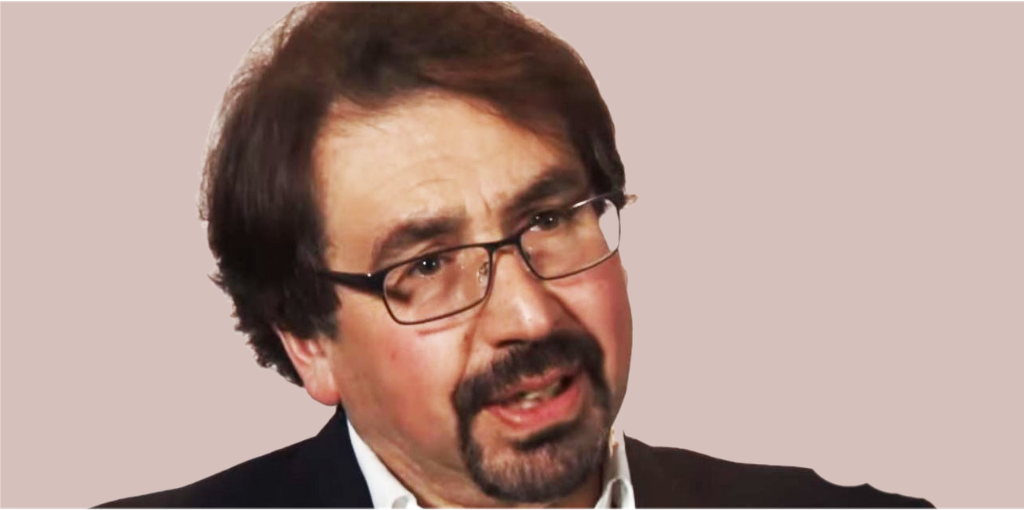
David Held
IMAGE LINKED: wikimedia Attribution 4.0 International (CC BY 4.0)
It is obvious that such a change will change the governance itself. New forms of government need to be implemented. Perhaps a government with the characteristics of ‘cosmopolitan democracy’ as David Held (1951 – 2019) [14] suggests, is more necessary than ever before, making it more universal to deal with the problem.
Addressing the problem of climatic change is a top priority for human survival. Any postponement speeds up the occurrence of difficult situations for the life and well-being of states and societies.
The dominance of a new Paradigm is the only solution. “What will follow, a new Dark Period, a new Enlightenment, or perhaps a combination of the two? The third version is probably the most likely. In this case, we all have to hope that the balance will lean toward the side of Enlightenment” [15].
In the change of Paradigm, as we have mentioned, education plays an important role. The change in how man views the environment can only occur if he is trained to see Creation itself differently.
To achieve this, it is necessary that he changes important issues of his everyday life. He must abandon the theory of Creation and accept that of Evolution. He must restrict the use of classical physics and incorporate in his training and everyday practice the theory of quantum physics and its applications.
He must reject any puzzlement and prejudice and realize that he is only a small element, perhaps important, of a Universe, from which only a very small percentage he knows.
It is necessary that he moves from individuality to collectivity and that he realizes that each one of us is no different from the other, so as to be alone and against all. He is different but in a common family, which is Nature and in which we are forced to live together with all other species.
Diversity and multi-formation of the different spares are necessary for the existence of Creation. He must understand that, truth and reality are not universal, but are his own and only his; that there are so many truths and realities as beings living on this planet or the whole universe.
He needs to develop new ethics that will propose the idea of solidarity, of helping fellow human beings, of the joint effort to achieve the project, of an economy for use rather than for accumulation.
He must develop the philosophy of belonging and not of being, of coexistence and not of possession, of use and not of abuse.

The Cosmos of Knowledge of the Self
IMAGE LINKED: wikimedia Attribution 4.0 International (CC BY 4.0)
Finally, it is necessary to turn his attention back inside him and to discover again a Cosmos that exists and has been forgotten.
The Cosmos of Knowledge of the Self and of the communication with it, of the guidance from it and reflection on the essential issues of Being and Life [16].
It is necessary for him to find time for himself, his family, friends and relatives. He must find time not to do something, but just to be there and to listen to the natural sounds which we have today covered with the artificial ones of ‘prosperity and progress’.
To make the change of Paradigm, it takes time and the participation of Civil Society. Freemasonry of the 21st Century is a part of Civil Society and its role in shaping the new consciousness, the ecological consciousness, is important.
The Freemasonry of the Grand Lodges does not deal with the ecological problem. The Mason is not interested in the ecological crisis.
There is not the slightest reference in the degrees rituals for the protection and the development of conditions that will promote an equal relationship with Nature. It is very normal.
The Freemasonry of the Great Lodges is the Freemasonry of the 18th, 19th and early 20th centuries. The Human of that time did not know the great discoveries and advances that science has done in the last quarter of the 20th century.
He did not know the environmental disaster that Human with his activities has brought about. What he wanted was to get to know the Cosmos and Nature and to stop fearing her.

the effect of human actions on the environment
IMAGE LINKED: wikimedia Attribution 4.0 International (CC BY 4.0)
The Masonry of the Grand Lodges also contributes to this effort. It tries through its Rituals to create a man with critical rational thinking who is based on scientific knowledge and rejects all authority and superstition.
At the same time, he tries to create a citizen, an active member of his society who will be an example to the rest of its members because of his behavior [17].
She urges him to be a good family man, worker and citizen who actively participates in the commons. Until the middle of the 20th century there ware enough for the mason to be an example of a “good man”.
But now at the beginning of the new century he knows the effect of his actions on the environment. He cannot claim otherwise. The new model of the moral human proposed by Freemasonry is necessary to include the new Paradigm and the Mason’s interest in the environment.
Like in 1717 the model of the moral Human proposed was that the new Paradigm then, against a World that wanted the Earth at the center of the Universe, so today the new Paradigm does not want Human at the center of Creation and sovereign.
He wants him to be a part of Nature who must adapt his way of life so that he can exist in the future when Nature has not changed so much as to be inhospitable to him.
All that we have said confirms the need for radical changes to our System at all levels and especially in the model of the “good man” he proposes.
I hope and I wish once again that they are realized and that “tradition” is not used as an excuse for do not doing something.
Otherwise, the Masons will be something of graphic people that deal with strange things behind the closed doors of their Lodges and away from the needs of modern society.
Footnotes
Reference
BIBLIOGRAPHY
· Giddens A The politics of climate change, Metaichmio, Athens 2009.
· Giorgos Boussoutas – Thanassoulas,, The naked woman , Ideotopos, Athens 2012
· Grand Lodge of Greece, Emulation Ritual, 2022.
· Held D. Models of Democracy, Polytropon, Athens 2007.
· Heywood A. Political Ideologies, tr. N. Marantzidis , published by Epikentro, Athens 2007.
· Klein N. This Changes Everything – Capitalism vs. Climate, Livanis, Athens 2014.
· Stern N The economics of climate change – summary, tr. K Lazaridis, A Tragaki, A Chouliaras, Hellenic Ministry of Foreign Affairs, 2008.
[1] The article is based on a presentation that I gave at the 3rd International Masonic Workshop, organized by Philotekton Society in August 2017 in Anavyssos Greece.
[2]Heywood A. Political ideologies, Epikentron, Athens, 2007, p. 472.
[3]Heywood A. ib. id, p. 476-477
[4] Giddens A The politics of Climate Change, Metechmio, Athens, 2009, p. 47.
[5]Giddens A Ib. id, p. 51-56
[6]Giddens A ib. id, p. 51-56
[7]Klein N. This Changes Everything – Capitalism vs. Climate , Livanis, Athens 2014, pp. 68-70
[8]Klein N. ib. id, p. 206
[9]Giddens A ib. id, p. 19
[10]Heywood A. ib. id, p. 506-507
[11] Stern N, The Economics of Climate Change. The Stern Review. Executive Summary, British Government, tr. Hellenic Ministry of Foreign Affairs, 2008 p. 10-11
[12] Klein N ib. id, p. 144-148
[13] Giddens A, ib. id, p. 176-181.
[14] Held D. _ Models of Democracy, Polytropon, Athens 2007, pp. 415-422
[15] Giddens A ib. id, p. 421
[16] See related Bussoutas – Thanassoulas G., The naked woman, Ideotopos, Athens 2012.
[17]This at least becomes apparent in the Emulation Ritual.
Article by: George Boussoutas Thanasoulas
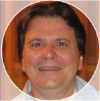
George Boussoutas Thanasoulas holds a Master's Degree in Public History, and Modern Greek History.
He has written five books and four monographs. His texts have been included in collective volumes and articles published in various journals.
George is a Past W. Master of Attikos Astir Lodge Nr. 139 of the Grand Lodge of Greece, Past President of the Council of General Affairs of the National Grand Lodge of Greece and Past W. Master of the Research Lodge of Isis Nr. 9 of the National Grand Lodge of Greece.
Website: www.bousoutas.gr
Recent Articles: of current interest
 Keeping Passions and Prejudices within Due Bounds Master your emotions and find balance in a chaotic world with Darren Allatt's "Keeping Passions and Prejudices within Due Bounds." Discover practical strategies for self-awareness, emotional intelligence, and building meaningful relationships. Transform your life with calmness, clarity, and purpose. Start your journey towards emotional mastery today. |
 Masonry in the Age of Leisure - P2 Explore the optimistic future of Masonry in "Masonry in the Age of Leisure" by VVenBro Scott Wisdahl. Delve into the possibilities of a leisure-driven society where technology enhances social bonds, decentralizes the Craft, and reshapes Masonic traditions. Discover how Masonry can thrive in an interconnected, tech-savvy world. |
 Masonry in the Age of Leisure - P1 Embrace the future of Masonry in the Age of Leisure! Imagine an era where technology empowers deeper connections, offering a tapestry of diverse groups united by Freemasonry’s timeless values. Envision hybrid meetings transcending borders, fostering brotherhood across continents. This optimistic future cultivates intellectual growth and social interaction, heralding a Masonic renaissance for all. |
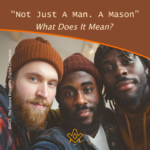 “Not Just A Man. A Mason”: What Does It Mean? Embrace the profound essence of Freemasonry, not merely a group but a journey of integrity, shaping men of dignity. By adopting virtues such as honesty, justice, and brotherly love, Freemasonry transcends time, urging us towards a dignified life. It’s more than being a man; it’s about living with unyielding dignity. |
 Multiculturism and the Culture of Freemasonry Freemasonry, with its deep roots in universal principles such as individual freedoms, education, and the pursuit of science, stands as a beacon of unity in a world divided by conflicting ideologies. By embracing the tenets of Freemasonry, including respect, peace, and mutual understanding, we can navigate societal challenges and foster a more harmonious world. |
 Embrace the new paradigm of eco-conscious living in the 21st century. Freemasonry, a cornerstone of society, must evolve, placing Nature at its heart. Reject anthropocentrism, embrace deep ecology, and champion sustainable living and global cooperation. Let Freemasonry lead by example, advocating for a world where humans and nature coexist harmoniously. |
 How Freemasonry Has Woven Itself into the Fabric of Society Like the weathered stones of an ancient temple, Freemasonry's origins are shrouded in mystery. This fraternal order has woven invisible threads throughout society's fabric since emerging in the 1600s. Despite declining membership, Freemasonry's influential legacy endures, seen in philanthropy, architecture, and the ideals of legendary members. Though facing challenges, revival remains possible if it adapts traditions to the modern era. |
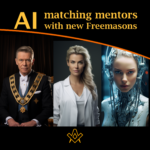 AI help in matching mentors with new Freemasons Harnessing AI for Freemasonry Mentorship: A Comparative Analysis. Freemasonry, an age-old fraternity, seeks to enhance its mentorship program by leveraging AI. While the Grand Master suggests detailed member profiles for matching, a Professional Coach emphasizes personality compatibility. Meanwhile, an AI Bot proposes machine learning for pattern recognition. Dive in to explore the potential and pitfalls of each approach. |
 Masonic Charities P.2 – The Shriners Discover the Shriners' legacy within Freemasonry; delve into their profound commitment to philanthropy and see how Masonic Charities demonstrate brotherly love, relief, and truth. Become inspired by the bonds that unite Shriners around the globe and their impactful work in local communities. |
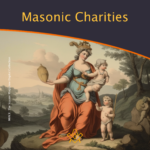 Freemasonry's commitment to charity has always been a priority and remains a core principle, reflecting its mission to promote brotherly love, relief, and truth in the world. Part 1 of the series gives an introduction to the establishment of the main Masonic Charitable endeavours in the 18th and 19th centuries and several key influencers. |
 Solomon Learning and Development Platform The Intersection of Freemasonry and Technology: Embracing the Digital Age with the New |
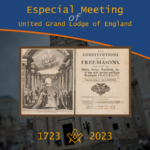 Especial Meeting of United Grand Lodge of England The year 2023 marks the tercentenary of the publication in London of the Constitutions of the Freemasons, based on Enlightenment principles that provide the philosophical foundations of modern Freemasonry. Why are the 1723 Constitutions important? Many Masonic histories have been concerned with ‘when’ and ‘what’. We also explore ‘why?’ |
 Like every other incident of initiation it is in the light of the larger meanings of Freemasonry that we must interpret the Rite of Destitution. But what does it mean? |
 Society of Grand Lodges in Alliance (SOGLIA) is a confederation of Grand Freemason Obediences in which all members obey the principles of Regularity. Assembled annually, in different places of the world, in order to share fellowship and to promote Masonic tradition, SOGLIA members are respecting the autonomy of each Grand Lodge. |
 Confederation of the Grand Lodges of Europe and the Mediterranean - Universal Freemasonry and its intellectual property are less and less taken into account in the current times of constant movement and unclear future prospects. |
 The Book of Law in Brazilian Freemasonry We are informed that, Freemasonry it is not a religion, but the candidate has a belief in a creative principle, which later, we call the Great Architect of the Universe. - by Fernando Rodrigues de Souza |
 Mike's Masonic Walks And Talks WBro. Mike Neville is a Masonic author and lecturer. He offers walks and talks primarily around London, based on his vast knowledge of the area and his specialist subjects, which cover all aspects of Masonic history. |
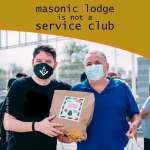 A Masonic lodge is not a service club An address delivered to the 10th Annual Conference of Western Canadian Grand Lodges (1950) in response to the question, "Should Our Western Grand Lodges Sponsor a Specific Program?" By |
 The Order of Bees was established as a youth initiative for the boys and girls of Prince Hall Freemasons, and symbolises the relationship existing between the activities of the youth and the family of bees. |
 The Confederación Masónica Interamericana (CMI) was founded in 1947, is a non-profit organization that groups together 92 Great Masonic Powers, admitted as members and distributed in 26 countries in South, Central, North, Caribbean and Europe. |
 This smartphone app is designed to work with all Freemasons from both Regular and Independent Grand Lodges around the world. |
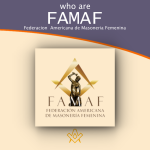 The American Federation of Feminine Freemasonry (FAMAF) is an organization that brings together Grand Lodges, Grand Orients and Confederations of Feminine Masonic Grand Lodges from the American continent. |
 The third largest Masonic Alliance of independent grand lodges, which currently has over 500,000 members in the world and an incredible resource of "good people with a good reputation" from around the world. |
 A Guiding Paw - my faithful 'brethren' A heart-warming story of one Mason's best friends – and how Gary's faithful guide dogs have helped fulfil both his Masonic life but also his valuable work in public service. |
 A visit to the Mother Lodge of Scotland Let me take you to the heart of Scotland to meet our Brethren of the Mother Lodge of Scotland, a journey into one of Freemasonry's deepest roots. Our guide Carlos Oliveira Santos who is from |
 An introduction to VEREINIGTE GROSSLOGEN von Deutschland / UNITED GRAND LODGES of Germany |
 International Masonic Union CATENA An international association of Grand Lodges and independent Lodges, with all true Masonic traditions, which adhere to the basic principles of the equal standing of men and women in Freemasonry |
 Social Impact of Prince Hall Freemasonry in D.C., 1825-1900. Alonza Tehuti Evans discusses Prince Hall Freemasonry, founded by African Americans. |
 Who are the Widows Sons, and what do they do, and how can you join ? |
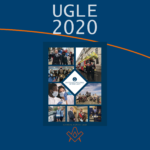 For the first time in its 300 year history UGLE has published an Annual Review |
 Founded in 1919 and named after the Grand Master of the Knights Templar, this International Order has helped young boys become great men. |
 9th International Conference of Freemasonry Hidden Meanings: Esotericism and Masonic Connections |
 An introduction to CLIPSAS and we look at who are they and what do they do |
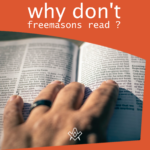 The title of this article will seem somewhat of an oxymoron, because at this precise moment you, most likely a Freemason, is reading this |
 Music can make you either remember everything or forget everything! They even call it the 'rhythm' of life because life does have a beat, a rhythm, a song! Music is equally important for Freemasons. |
 Young Masons' Inter-Club Virtual Social An initiative was created to initially keep Brethren engaged in their Masonry whilst the restrictions of the COVID-19 pandemic are in place. |
 I've heard people say that we don't have heroes |
 What can we learn from Steve Jobs' address given at Stanford in 2005 |
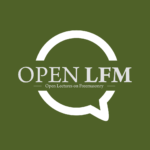 Open Lectures on Freemasonry as a series of monthly online lectures that aims to increase the visibility and accessibility of research into Freemasonry. The lectures are open to anyone who is interested. |
 What Kind of Library Do You Have? Many Brothers have no clue as to what kind of "Craft" library they actually have in their home or office. Most of these Brothers don’t care that they don't know – so, what kind of library do you have? |
 Russian Freemasonry a combination of a short sketch of its history and a review of the present-day Masonic landscape in this country |
 A brief outline showing the differences and similarities within Freemasonry |
masonic knowledge
to be a better citizen of the world
share the square with two brothers

click image to open email app on mobile device
